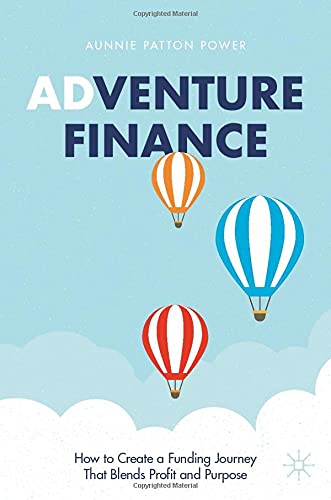The Rise of VC Alternatives
The Rise of VC Alternatives
with Aunnie Patton Power
The Rise of VC Alternatives
with Aunnie Patton Power
Aunnie Patton Power is a university lecturer on Innovative Finance, Impact Investing and Technology for Impact and an advisor on these topics globally. Aunnie is one of our experts on The Alternative Funding School. Below, she shares her view on the rise of VC alternatives.
What was your path to Alternative Funding?
I started in investment banking and loved finance but quickly realised I wanted to change how I used it. This was the heyday in New York, Chicago.
The turning point for me was doing a deal on healthcare, and the client asked me (verbally, not in writing, because it would have been illegal!) to figure out a way so they could put less money into treating patients and more into their bonuses. They wanted me to use my financial modelling to figure that out.
And I could.
But that's when I realised I didn't want to be doing that.
In 2007, I read a book by Muhammad Yunus called ‘A World Without Poverty and discovered this idea of social businesses when the ideas around impact investing were young and new.
I contacted recruiters to see if there was another path besides getting the traditional private equity job I was interviewing for. And they said, “Oh, you want to work for a nonprofit?” But that wasn’t what I wanted, so I didn’t do that.
So I turned down the private equity job offers, quitting and doing a year of travel.
I spent about six months in India, where I was exposed to this burgeoning world of microfinance. I returned there and worked for an organisation that was the first investment bank for social enterprises (talk about finding your niche!)
I worked with them to develop strategies for doing equity instead of just debt (because they were lending money to microfinance institutions). And what I found out again was that these impact deals that I was doing, these term sheets, these fund structures, they looked the same as the ones that I had been doing before, except for somewhere at the top that said “Creating health impact” or “Lending to poor people”.
That just really struck me and others as incongruent. If we're trying to change how capital is allocated, why are we using the same tools we used before?
So I moved from there, went to Oxford, and did my MBA. I worked in Ghana for a bit and went to the Meltwater School of Technology, trying to play around with what alternative structures would look like for startups.
Then for the past ten years have lived between the UK and South Africa, wearing several hats, learning about financial structures, iteratively designing them and teaching them.

At the end of 2019, I decided I needed to write it all down because there was no central repository other than the resources I kept online.
So, I decided to write a book.
Eighteen months into the pandemic, I published Adventure Finance.
I encourage you to read the book. High school students helped me edit it to make it as easy as possible to read. Many stories are in there, and it’s written with everyone in mind.
Adventure Finance has spun out into a lot of different things. Another exciting development that Esme is helping with is working on an online diagnostic tool with Village Capitals that takes the book criteria and opens up suitable options for you.
What's your advice for founders who think VCs might be the right fit for them and aren’t sure what to do first?
At the beginning of the book, there's an inventory that I ask founders to do, and we go through this in one of your Alternative Funding School classes, as well.
I ask founders to think about who they are and their funding needs.
One thing that many founders don't realize, for instance, is that equity is not a very good source of working capital. So, if you're trying to fund the day-to-day operations of your business essentially, it's a really expensive way to do that.
If you are a founder that currently has revenue, there are several options you can look at to try and figure out ways to source an income. So, for instance, things like purchase orders or other types of factoring, which means you take orders from your clients and turn them into cash, either by encouraging your clients to pay early, which you can do, we all do all the time, every time someone offers us a year subscription for 50% less than paying per month, we're funding the working capital upfront. We can get our clients to do that as well.
You can also use other financiers for this. There are global purchase order financiers and invoice factoring organizations, allowing you to take larger orders to them to get some of that capital upfront.
Another growing option is ‘revenue-based financing’, similar to a merchant cash advance where you work with a credit card company or a payment vendor to borrow against your future receivables. But revenue-based financing is essentially where you go to a funder, saying, “This is what my last six months look like funding-wise. Would you lend me money against what my next six, twelve, eighteen months and two, three years of revenue will be?” Then revenue-based financiers take your payment as a percentage of your revenue. So you may negotiate that you'll pay back 5% of your revenue until you hit a certain amount. So it might be one and a half times what you borrowed over three, four, or five years. Or it might be the amount you borrowed plus 10% over two years.
It's a flexible form of financing. It can be used effectively instead of equity, particularly if you have revenue and a high margin and are looking at customer acquisition.
Google AdWord; is a terrible thing to use equity funding for because it's short-term. Suppose you're selling equity to buy, you know, $10,000 worth of Google AdWords. In that case, you're selling a portion of your company's cash flows forever for that $10,000 buy that will potentially translate into a certain number of customers in the next few months.
What if you don't have revenue? There are options if you don't have revenue. What I like a lot is something that I call “redeemable equity”, which goes by many different names in the market. But essentially, it's a type of equity investment that your investor agrees that you will repurchase from them at some point in the future.
Revenue is always the cheapest source of financing.
Redeemable equity is not as common as revenue-based financing. Still, it’s a way to potentially come together with a funder and come to an agreement that allows you to understand how your business's growth will be.
The thing to remember is that revenue is always your cheapest source of financing, and a lot of founders forget that. It's about figuring out what products you can potentially get out. Now, some of you will be in super investment-heavy industries and have to build up a ton before you get there. But others of you aren't.
One of the things that we, as an industry, fell into many people during the last ten years was it was so easy to get outside funding that people lost focus on just creating revenue.
So I always tell social entrepreneurs or entrepreneurs with a social mission that you often create value for more than just your customers. So sometimes a way for you to think about it is, “Well, my end customer may not be ready to or can't buy this good or product, but maybe there is another organisation, like a corporation, that's interested in the impact that I'm creating”
However, before you go out to find external funding, it's essential to make sure that you're looking at how your revenue looks. Are there ways for you to create revenue? Sometimes, honestly, it is by the consulting and advisory work that you do alongside your product development. And yes, some VCs will look down on that and say, “Well, you're not full-time on product development”, but if that's not who you're going to, that's fine.
So figuring out ways to prop up and make your business sustainable internally is crucial before you go out and even externally ask for money.
What do you think of VC funding? And why would somebody look elsewhere?
VC funding was created for a very specific purpose. It was created to fund fast-growing, highly-scalable, technology-enabled companies, and that's what it works well for.
It is, in essence, a very sophisticated version of playing roulette.
So, you, as a funder, bet on ten companies, and you hope that one of them will come up trumps.
And that's how VCs models are built.
It means that every company they invest in has to be able to ‘return the fund’. Every company they've bet on has to make them enough money to compensate for the other companies that will not work.
This means that if your business (and I'm assuming a lot of your businesses here are not trying to be the next Facebook) means, many VCs just won't consider you.
One of the things that frustrates me is when social enterprises that are stable/high-growth with reasonable projections in middle-sized markets put themselves through the ‘Cirque du Soleil’ to get into that box that looks like a hockey stick projections that say they're going to be the next Airbnb, Facebook, Dropbox, etc.
And I don't think it's fair, to be honest, to ask VCs to change. I work with many VCs, and the type of venture capital equity works well for a specific company.
The problem is that for a long time, since it's been around, it's been the only type of risk capital available for growing small businesses that don't yet have revenues.
And so, we need to develop options for entrepreneurs that are risk capital but without the same type of expectations of VC.
This is where you, as founders, working with like-minded investors, decide what makes the most sense for what's the growth trajectory of your business, as well as what's the ownership trajectory of your business; do you want four outside investors to own most of your business in three to four years? Do you want investors to make you sell your business in five years?
One thing that often surprises entrepreneurs when I tell them is that the minute you take equity investment, particularly institutional investment from a venture capital fund, a clock starts. You have to be ready to sell your business in five years because that VC has to start exiting the businesses, and they're ready to start returning to their investors.
So, if you want to own your business for over five years, taking venture capital funding may not be the correct route. And if you don't want to be on the VC treadmill that says that if you're not growing at 50% per month, then you know, you're growing too slowly.
How do we address the disparity of funding to female investors?
There are two things here. One is that I find female entrepreneurs are more, I would say cognizant of the downsides of equity. And so they're more likely to be secure enough in who they are to say, “I'm not going to judge the success of my business or how much funding I can raise”.
I think that's something we saw in the last ten years is that when companies were lauded, the stat that is immediately published is how much they've raised, not how much revenue they have or how many users they have, or anything that's about them as a company, just how much they've raised. Now we've seen what happens, and we raise a lot of money, no one's going to put that up, as you know, an example of a very successful business.
We need more women in all forms of investment.
So, on the one hand, I would say that women investors and entrepreneurs are sometimes trying to go the less travelled path, which can be difficult. We need more women in all forms of investment.
One of the things I do here in South Africa is I formed a syndicate of angels, and we have invested in five female-owned businesses. Part of it was also to teach other women. Some of that was about teaching other angels how to write cheques.
Make it simple. You can do angel investments with $1,000 if you want to (technically, you can do less than that with crowdfunding).
I'm hesitant to push women into just equity investing. There are also lots of ways to lend money. More encouragement, more financial education, and more access to tools they need to be able to invest.
What are your thoughts on Angel Investors vs VC?
What's interesting is that most angel investors are using equity. So, that's a conversation you can have.
As an angel investor, I can share that we use a few different types of funding, including essentially redeemable equity and things that look like revenue-based financing.
Angel investors are generally less sophisticated (I can say that as I am one); they're investing their own money instead of “OTM” - other people's money. They can make decisions based on what they want to do versus what an investor in their fund has told them to do.
They both have different t. Angel investors generally invest much earlier, based more on relationships, and have a more dynamic and flexible way to source deals.
It depends if you're at a very early stage and can connect with an angel investor, that can be a great source of funding and mentorship. And I would encourage you to build a relationship with someone that wants to do angel investment and want to look outside of equity to have a conversation with them.
Most angel investors are interested in how they support the company, not necessarily how they write the same check every time.
Institutional VCs are much less likely to be able to write alternative cheques because investors have given them money on a set of principles. So, if they suddenly start saying, “Well, we're going to be doing revenue-based financing”, or “We're going to do invoice factoring”, their investors would realistically say, “No, we didn't give you the money to do that”.
Institutional investors, traditional venture capitalists, will tell you on their website what they're looking for, and they have very little deviation from that.
That’s another thing that Esme and I both say is, “Know your investors”. A lot of people waste a lot of time. I get dozens of “Dear Sir” emails. Some put my name at the top and then copied and pasted their request at the bottom. I try and respond to all emails, but I don't respond to those.
I say everywhere online, “I invest in female-owned businesses in South Africa”. That's it.
The easiest way to turn off any investor, whether alternatives or VC investors, is to ask them for funding when you are clearly outside their scope.
Watch the video above for more answers to questions from the community.
Top takeaways
- Aunnie began her career in investment banking but realised they wanted to use finance differently after being asked to prioritise bonuses over patient care.
- Aunnie emphasises the importance of creating revenue alongside seeking external funding and suggests that consulting and advisory work can help sustain a business.
- They also caution that VC funding is best suited for fast-growing, highly-scalable, technology-enabled companies.
- The venture capital (VC) model is like playing roulette, where investors bet on multiple companies and hope one will succeed.
- The VC model doesn't work for all businesses, especially those not trying to be the next Facebook.
- Female entrepreneurs are more aware of the downsides of equity and are more likely to seek alternative funding options.
- Angel investors are less sophisticated and invest earlier based on relationships, making them a good source of funding and mentorship for early-stage startups.
- Institutional VCs have less flexibility in their funding options, and it's essential to know your investors and not waste time on ones outside your scope.
Spread the word on alternative funding options with your network by clicking below
Ways we can support you on your fundraising journey
If you're ready to find your fundraising confidence, then we provide products and programmes to support you along the way. Check out our current offerings below.

Hands-on support for purpose-driven organisations raising mission-aligned funding all over the globe. 97% of alumni would recommend us to founder friends.

Never miss a UK funding opportunity again. Search for new grants, accelerators and more using our exclusive LIVE Funding Database which is updated weekly and curated for our community fundraising in the UK.

If you are looking for an introductory course into raising funding as an impact organisation, this is for you. Identify the best next step on your fundraising journey and meet incredible purpose-led founders along the way.

Connect and learn
Accelerators & Funders
contact@consideredcapital.io
Log in to our other platforms below
